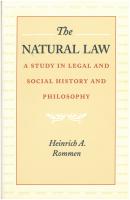The Natural Law. Heinrich A. Rommen
Чтение книги онлайн.

Читать онлайн книгу The Natural Law - Heinrich A. Rommen страница
Название: The Natural Law
Автор: Heinrich A. Rommen
Издательство: Ingram
Жанр: Юриспруденция, право
Серия: none
isbn: 9781614871798
isbn:
This book is published by Liberty Fund, Inc., a foundation established to encourage study of the ideal of a society of free and responsible individuals.
The cuneiform inscription that serves as our logo and as a design element in Liberty Fund books is the earliest-known written appearance of the word “freedom” (amagi), or “liberty.” It is taken from a clay document written about 2300 B.C. in the Sumerian city-state of Lagash.
© 1998 by Liberty Fund, Inc.
This eBook edition published in 2013.
eBook ISBNs:
Kindle 978-1-61487-090-6
E-PUB 978-1-61487-179-8
NIHIL OBSTAT
Matthaeus Britt, O.S.B.
IMPRIMI POTEST
NIHIL OBSTAT
Ioannes McCorkle, S.S.
Censor Librorum
IMPRIMATUR
Die 15 Ianuarii, 1946
Contents
PART I HISTORY OF THE IDEA OF NATURAL LAW
I. The Legacy of Greece and Rome
II. The Natural Law in the Age of Scholasticism
III. The Turning Point: Hugo Grotius
IV. The Natural Law in the Age of Individualism and Rationalism
V. The Turning Away from Natural Law
VII. The Reappearance of Natural Law
PART II PHILOSOPHY AND CONTENT OF THE NATURAL LAW
X. The Structure of the Sciences
XIII. The Content of the Natural Law
XIV. Natural Law and Positive Law
Heinrich Rommen is known in the United States primarily as the author of two widely read books on political philosophy, The State in Catholic Thought: A Treatise in Political Philosophy (1945) and The Natural Law (1947), and as a professor at Georgetown University (1953–67). Yet, before 1938, when he fled the Third Reich for the United States, Rommen was neither a scholar nor a university professor, but a professional lawyer—trained in civil and canon law—who had devoted considerable energies to Catholic social action during the dissolution of the Weimar Republic and the rise of the Nazi Party. The two books that secured his academic reputation in the United States were written in Germany in the midst of his legal and political work, for which he was imprisoned by the Nazis.1
Although The Natural Law displays erudition in a number of academic specialties (law, philosophy, history, theology), the reader will appreciate that the book was written by a lawyer in response to a political and legal crisis.2 As a practicing lawyer, Rommen watched with alarm as the Nazi party deftly used German legislative, administrative, and judicial institutions to impose totalitarian rule. “Our modern dictators,” he remarked, “are masters of legality.”3 “Hitler,” Rommen concluded, “aimed not a revolution, but at a legal grasp of power according to the formal democratic processes.”
Every generation, it is said, finds a new reason for the study of natural law. For Rommen and many others of his generation, totalitarianism provided that occasion.4 As he put it in his book on the state, “When one of the relativist theories is made the basis of a totalitarian state, man is stirred to free himself from the pessimistic resignation that characterizes these relativist theories and to return to his principles.”5 Rommen’s writings were prompted by the spectacle of German legal professionals, who, while trained in the technicalities of positive law, were at a loss in responding to what he called “Adolf Légalité.”6
What caused this loss of nerve, if not loss of moral perspective? Rommen points to the illusion that legal institutions are a sufficient bulwark against government by raw power—as though a system of positive law takes care of itself, requiring only the superintendence СКАЧАТЬ